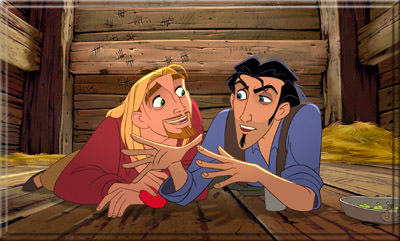 A response to El Dorado Ignores Genocide of Natives by Ruben Chavez:
A response to El Dorado Ignores Genocide of Natives by Ruben Chavez: A response to El Dorado Ignores Genocide of Natives by Ruben Chavez:
A response to El Dorado Ignores Genocide of Natives by Ruben Chavez:
To change the subject, regarding the "The Road to El Dorado" cartoon, I... really liked it. This is coming from a person who is half Spanish and half Native American. Even though I'm proud of both sides of my heritage, I find I lean more toward my Native American side. Part of the reason is the Spanish, like their other European counterparts, greatly contributed in destroying and desecrating the Indian culture. In spite of my heritage and being very conscientiously aware of "real" American history, I feel animations like "El Dorado" are very important.
I'll tell you why. Native Americans, also the Hispanics, I tend to call them the invisible people. If you go by the media, even by the history books we don't exist, we are just oddities. We never fought in World War II, or the Civil War for that matter. (As you probably know, many, many Latinos and traditional full blooded Native American fought on both sides of the Civil War, but the printed media including Hollywood would make you believe it was just a white war fought in places like Gettysburg.) Nor do the Invisible People drink Pepsi or Coke, it looks like we're not American consumers. It's changing, but ever so slowly.
So when I see something like "El Dorado". I look at the big picture. At least we're not invisible. Now the next step is get the picture less blurry and more into focus, more accurate.
Because even though animations like "El Dorado" and "Pocahontas" may not be perfect, it beats a world that just only has "Sleeping Beauty" and "Snow White".
Well there's my two cents, I know, I know, you can't buy much with it.
My response to Ruben:
>> This is coming from a person who is half Spanish and half Native American. <<
Did you read the comments on my site by Tezcatlipoca and Vazquez? Presumably their heritage is the same or similar to yours. Maybe you're just a glass-half-full kind of guy.
>> (As you probably know, many, many Latinos and traditional full blooded Native American fought on both sides of the Civil War <<
I know more about blacks fighting than about Latinos or Native Americans, but I believe it.
>> At least we're not invisible. Now the next step is get the picture less blurry and more into focus, more accurate. <<
Well, I didn't call for a boycott as Tezcatlipoca did. I guess my position is "Do movies like this but do them better." That's why I reported good things about The Other Conquest in another issue of ICI.
Rob
Here's another reader's response to the issues you raise:
I haven't seen the movie yet, but the "better than nothing" is a dangerous sentiment when it comes to image control and its effects. The African-Americans didn't have the ability to control their image in the early days of radio, film, and television -- so an art form developed centered around their degradation. It crossed all mediums.
Latinos and the Indigenous can affect these things today. So, while it may be ok to enjoy it on a personal level, you must also consider what those who created this film will do the next time -- and again -- and again. And when will it end. Until there are more Latinos and Natives behind the camera, we need to keep a watchful eye over who is controlling our image.
Richard L Vázquez
About Guide to Latino Culture
http://latinoculture.about.com
|
. . . |

|
All material © copyright its original owners, except where noted.
Original text and pictures © copyright 2007 by Robert Schmidt.
Copyrighted material is posted under the Fair Use provision of the Copyright Act,
which allows copying for nonprofit educational uses including criticism and commentary.
Comments sent to the publisher become the property of Blue Corn Comics
and may be used in other postings without permission.